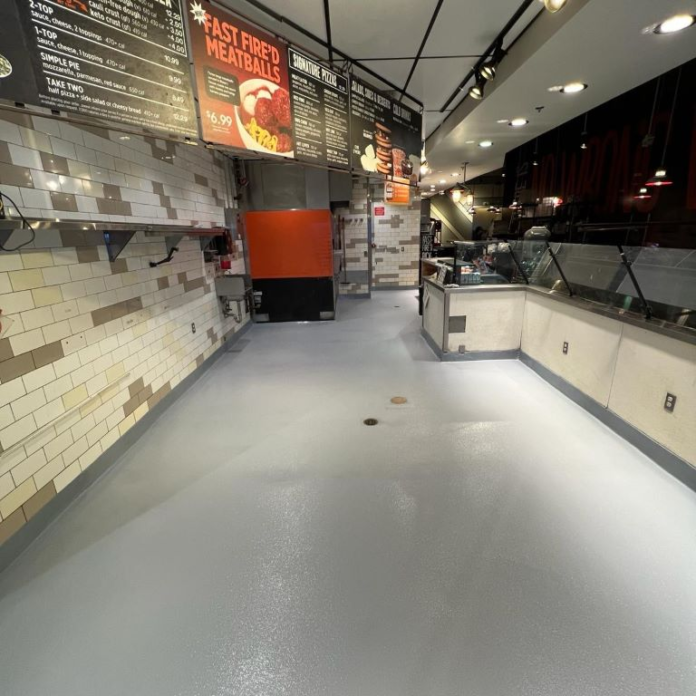When creating or remodelling a kitchen, whether it’s for a home or a business, picking the proper flooring is important for both looks and how well it works. Epoxy kitchen flooring and industrial kitchen flooring are becoming more and more popular since they are durable, easy to clean, and look great. These two types of flooring are great for kitchens that get a lot of foot traffic and need to be clean and tough.
Why People Like Epoxy Kitchen Flooring
People like epoxy kitchen flooring because it is strong and can be used in many ways. This flooring system is a smooth, strong, and easy-to-clean surface made of resin that is put over concrete floors. Because it is not porous, epoxy kitchen flooring is very useful in places that need to be very clean, like kitchens. Because spills, stains, and moisture can’t get through the surface, it doesn’t get mould, bacteria, or smells. This not only makes the floor cleaner, but it also keeps it looking good for a long time.
One of the best things about epoxy kitchen flooring is that it can handle a lot of foot activity and the impact of dropped pots or utensils. This flooring may be made to fit any kitchen style because it comes in a lot of different colours, patterns, and textures.
So what is the reason to select industrial kitchen flooring?
Commercial kitchens (in hotels, restaurants and large-scale catering enterprises), however, demand of their floors a far more rigorous satisfaction. Industrial kitchen flooring is a high-performance option that can handle a lot of foot activity, spills, and heavy equipment. This floor is made to last in industrial kitchens, where chemicals, heavy machinery, and extreme temperatures are typical.
Industrial kitchen flooring is made to last and not wear out, unlike other types of kitchen flooring. It can handle spills of oil and grease, sharp objects, and hot surfaces without getting damaged. The surface doesn’t slip, which is very crucial in busy kitchens where safety is the most critical thing.
Main Differences Between Epoxy and Flooring for Industrial Kitchens
Epoxy kitchen flooring and industrial kitchen flooring are both made to last and be easy to clean, but they are used for different things. Epoxy flooring is great for home kitchens or small businesses that need a smooth, attractive surface that won’t stain or spill easily. On the other hand, industrial kitchen flooring is made for big commercial kitchens where there is a lot of foot traffic, heavy equipment, and severe environments.
Epoxy flooring is often more customisable in terms of design, so homeowners and businesses can choose colours and patterns that go well with their kitchen decor. The flooring in an industrial kitchen is, however, most concerned with safety and utility over appearance.
Keeping Kitchen Flooring Strong
It’s not too hard to take care of either epoxy kitchen flooring or industrial kitchen flooring, but they need distinct care regimens. To maintain your epoxy flooring looking its best, you should clean it often with mild soap and water. Avoid using strong chemicals since they can harm the resin surface. It’s also crucial to fix any cracks or damage right away so that the floor doesn’t get worse.
Because industrial kitchen flooring is so tough, it doesn’t need to be cleaned as often, but it still needs to be cleaned regularly to keep oil and dirt from building up. To keep the surface in good shape, you need to use the correct cleaning products. In either case, regular checks are suggested to find any signs of wear and tear, which will help the flooring system last longer.
Conclusion
both epoxy kitchen flooring and industrial kitchen flooring have many benefits, such as being long-lasting, easy to clean, and safe. This is true whether you’re putting up a home kitchen or a large commercial kitchen. The best flooring for your kitchen relies on the needs of that space. Epoxy kitchen flooring can be the ideal choice if you want something that looks good and works well. Industrial kitchen flooring is better for more demanding business environments. Visit highperformancesystems.com for additional information on how to choose the ideal flooring system for your needs.

